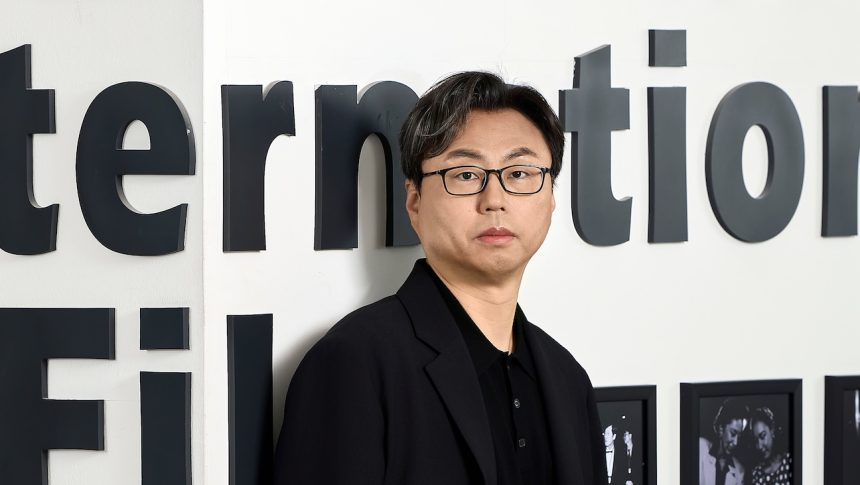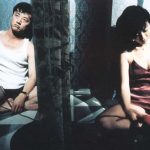Busan Film Fest Director Jung Hanseok Has a Plan — And a Lot of Pressure
There will be no escaping the spotlight for the Busan International Film Festival’s freshly minted director Jung Hanseok.
But taking on the role after six years as the festival’s Korean cinema programer means he knows full well what he’s in for. Jung has lived and worked through well-publicized recent spats with various governments and felt first-hand the pressures being shared by festivals across the globe as production numbers decline, audience numbers drop and competition for content heats up.
Jung’s former role also gave him a unique perspective as content from South Korea — if not Asian as a whole — has captured the attention of the world and he’s confident the stars are aligned for the 30th edition of Asian premier industry gathering, both figuratively and literally.
Hollywood and international A-listers have flocked to the South Korean port city, among their number Michael Mann, Guillermo del Toro and Juliette Binoche. So, to, have Asia’s stars, including local luminaries including Bong Joon Ho, Lee Chang-don, Lee Byung-hun and Son Ye-jin as well as veterans Tony Leung Kar-fai and Sylvia Chang.
You Might Also Like
BIFF is promising 328 films in total across 31 screens overits 10-day run to Sept. 28,so Jung has no doubt been preparing to lean on some deep breathing exercises as this 30th edition plays out, and the crowds begin to gather around the sprawling Busan Cinema Centre. But first he sat down to answer a few questions from The Hollywood Reporter about what’s ahead.
What is the message you would like to share with the film world now that the 30th edition of BIFF is opening?
I want to emphasize two things. First, as we celebrate the 30th edition, BIFF has sought to create a new turning point by revisiting its legacy of memory and solidarity with Asian cinema. Our Special Program in Focus: Defining Moments of Asian Cinema Forum addressing pressing issues in Asian cinema today, and the newly established Competition section dedicated to Asian films are all part of this effort. With these initiatives, we aim to reflect comprehensively on the current stature of Asian cinema. Second, we have also expanded the festival’s long-standing identity as an audience-centered festival. This year’s remarkable lineup of guests, a wide range of special events, substantial enhancements to various programs, and even the expansion of screening venues all serve this purpose. Through these initiatives, the 30th Busan International Film Festival aspires to be a true celebration of cinema that maximizes the collective experience of theater experiences for the audience.
What drew you to taking on this role — and the challenges it will obviously present — and what is your vision for the festival?
Even when the first three rounds of recruitment for the festival director fell through, I never considered applying for that position. But by the fourth round I made the decision rather quickly. I felt that simply standing by was no longer an option. We did not have the luxury of time. At that moment, I felt confident that I could take on the role better than anyone else. The main challenge, of course, was the very limited time I had. I officially began my duties on March 21, and it has only been a little over five months since then. Fortunately, having served as a Korean cinema programmer for the past six years, I had already experienced and examined the festival closely, which allowed me to manage without major difficulties. When we unveiled the program lineup on August 26, the reactions were very encouraging. A particularly memorable, funny meme in Korea was: “Will the Busan International Film Festival end this year? Will there be no next year?” To me, that was the highest form of praise, a recognition that we had prepared so thoroughly.
Personally, I avoid relying on slogans. They are convenient, but it is also an easy way to evade responsibility. Of course, it’s possible to dress up the festival’s vision in sophisticated and plausible words, but instead, I prefer to put it this way: What I have done this year is to make careful choices and concentrate on them, to break from inertia, and to breathe vitality into the festival by focusing on the details that truly matter. After all, isn’t the devil in the details? Each year, my vision is to examine those details thoroughly, improve them and find practical solutions. That is how the festival will sustain itself as a living, dynamic, and vital presence.
Can you share a little about the move to make BIFF a competitive festival and why you think this initiative was needed?
I prefer to describe this year’s change, not as a “transition to a competitive festival” but rather as the “establishment of the Competition section.” BIFF has always been an audience-centered festival, and in many respects — its origins and its mode of operation — it differs significantly from Cannes, Venice or Berlin. Even so, there were clear reasons why the introduction of the Competition section became necessary. The festival’s representative sections — New Currents and the Jiseok section — while meaningful, have shown their limitations. If I were to ask someone, “What were the winning films in last year’s New Currents and Jiseok sections?” most people would find it hard to answer. I myself realized that I could not recall them either. In other words, despite our pride in these sections, they lacked real impact and effectiveness. This made us recognize the need for a stronger, more substantial competitive framework, a new “system” or “initiative”.
We decided, however, to set a clear parameter: it would be limited to Asian cinema. In that sense, the new Competition section can be regarded as an integrated form of the New Currents and Jiseok sections. With this new framework, curated through the festival’s own perspective and discernment, we aim to present a lineup that illuminates the current trends, directions, and visions of Asian cinema, and in doing so, to strengthen the festival’s influence.
BIFF has weathered a number of storms over the years, how would you describe the situation now and the mission statement looking ahead?
Several international filmmakers I met this year asked me, “How is the Busan International Film Festival doing these days, given its complicated situation?” Each time, I replied, “Everything is fine now.” And that is indeed the truth. What matters is to focus on the present. If you pay close attention to the programs we have prepared this year, you will sense that the festival is moving forward in a very positive direction.
From the moment I was appointed, I set myself a clear mission, one that I have pursued vigorously over the past five months: to break away from the festival’s internal inertia.
What do you see as the most pressing issue the Korean industry is facing?
The most pressing issue is that the number of people going to theaters has declined significantly. This is not simply the result of the proliferation of streaming platforms, but rather stems from chronic problems that have accumulated in the Korean film industry over a long period of time. Although, I do not think this is the place to go into that discussion in detail. Of course, a film festival cannot solve this problem entirely, but it can surely help. A festival is precisely the place where audiences who come to see films in theaters can experience the collective spirit of cinema to the fullest. They watch compelling films, meet the guests, enjoy various events, and then return home with those memories. In this way, the festival can motivate audiences to renew their interest in cinema. That is how I hope the festival can contribute to addressing the current challenges facing Korean cinema.
You’re known internationally for helping unearth new Korean talent in your previous role. Can you point us towards a few “ones to watch” from among the locals in the lineup this year?
Let me introduce the three Korean films that have been selected for the Competition section: Funky Freaky Freaks, En Route To, and By Another Name.







